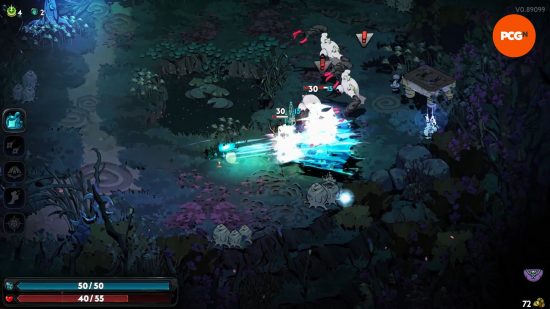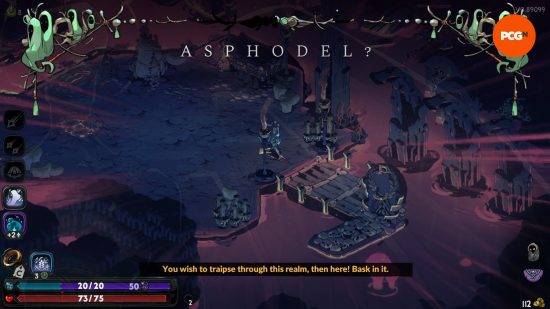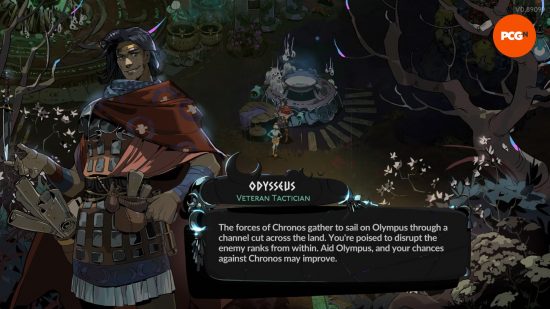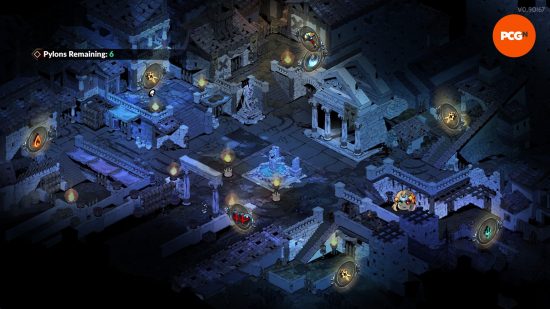Ah, Hades. My game of the year for 2018 even in its early access form, and the closest thing to a perfect roguelike that’s ever existed. With its deep narrative entrenched in Greek mythology, tales of familial struggles, and LGBTQ+ representation that feels organic and inclusive, it’s easy to see why Hades struck a chord with a vastly diverse audience. Hades 2 enters early access seven years after its predecessor, and the time and love that Supergiant Games has put into it is evident from the off.
I said in my Hades 2 preview that the roguelike game‘s highly anticipated sequel was already better than the original in every way, which admittedly was a bold statement given the limited material in the technical test. Now that I’ve gotten 20-plus hours into Hades 2’s early-access form, I stand by that sentiment and then some.
The similarities are obvious: drop into the world, collect upgrades along the way while obliterating rooms of enemies until you reach a boss fight, which guards the door to your continued descent. You will die a lot, sending you back to the game’s central hub, The Crossroads. Here, you can purchase permanent buffs and unlock items to assist you on your quest against the big bad Chronos, the God of Time. Hades 2 expands on the original by providing a colossal amount of options, whether that’s keepsakes gifted to you by the Gods, weapons, gathering tools, prophecies, incantations brewed at the cauldron, or the encounters themselves.
This time around, we take on the role of the Princess of the Underworld, Melinoë. Where Zagreus was on a mission to escape the Underworld and face off against his father, Hades, Melinoë is torn between heading to Tartarus to carry out the punishment of Chronos, or aiming for the surface to engage in a battle against his armies. As Odysseus helpfully tells me, aiding Olympus at the surface could well improve my chances against Chronos, so I figure I should explore the upper realms in full.
Rather than dilute the narrative or create additional unwarranted combat that soon grows stale, this expands Hades 2, creating an unfathomably monumental storyline with various encounters that cause me to gasp and pause the game to process an instantaneous feeling of awe.
As Chronos traps me in a mimicked Asphodel from the first game, I grin; that comforting, almost nostalgic feeling teleporting me back to the way I felt when I played Hades for the first time. Boarding a haunted warship bound for Olympus introduces wave after wave of foes set on my demise, and a limited space in which to evade them, mixing up the combat style and ensuring Hades 2 finds ways to deviate from its formula, even within the bounds of its roguelike genre. Hades 2 has broadened its scope far beyond anything I could have dreamed of; it’s like getting two Hades games in one.
While the Gods and Titans still offer skills and buffs via the Boons system, there are more on offer this time with the addition of new characters. You can now collect Elements from the Boons you select. These essences have no innate benefits, but the Olympians will occasionally offer powerful infusion Boons that grow stronger the more elemental essences you collect on your travels. The new Path of Stars system grants the ability to customize my Hex: a powerful, limited-time ability that you can fully alter for each run. Given these can turn the tides for or against me, I soon learn that I have to calculate my choices wisely to venture further each time.
This is triggered by using a specified amount of Magick, which is limited and displayed above the health bar, and can also be used for more powerful Omega attacks by holding down the relevant button. It turns Melinoë into a demolition machine, vastly expanding upon and improving the limited combat mechanics Zagreus had in his arsenal.
Far from becoming overwhelming, these new mechanics serve to broaden the scope of possibilities for each playthrough. I’ve done countless Hades 2 runs, turning myself into the likes of a speed demon who can weaken foes with my sprint, a slaughtering machine wielding the powers of the ocean to send enemies flying across the map, and a glass cannon capable of unleashing devastating damage.
Melinoë was created for the player to seamlessly step into the shoes of; her mysterious past slowly unfolding as you increase your relationship with the various Hades 2 Gods and characters dotted around the Crossroads. Taking a dip in the hot springs with Dora, the listless shade, will gradually reveal her own origin story as you bond with this flippant, and frankly hilarious, spirit.
On the other hand, offering the bath salts to the likes of Moros will initially cause him to become flustered, attempting to politely decline your advances while failing to retain the composure that the God of Doom rarely ever breaks. Melinoë is sultry, but never overwhelmingly so. Her powerful nature and ability to do things the other Gods could only dream of is admired unabashedly by the peers she engages with nightly. She remains modest, seemingly unaware of just how indomitable she is.
Hades’ characters are fully fleshed out personalities in their own right. They don’t exist around the protagonist, but fill their own spaces, interacting with each other and not solely with the player. Eavesdropping on conversations in Hades 2 proves more enlightening than ever, and I come away from these easily missable encounters feeling like I’ve gleaned important information on who they are as people as well as the events – such as the fall of the House of Hades – that have led to the game’s present day.
Our protagonist is stuck in a love-hate relationship, similar to her brother and his complex, entangled encounters with Megaera. Indeed, Melinoë and Nemesis’ twists and trysts imply relationships, mirroring the first game’s excellent LGBTQ+ representation. They serve as a reminder that, despite the ancient Greeks being, well, ancient, our contemporary societal values and broadly accepted lifestyle choices really aren’t that different from 3,000 years ago.
Supergiant Games has demonstrated through its other games, Bastion, Transistor, and Pyre, that it promotes acceptance and empathy towards all, and it is this approach that causes its communities to be close-knit, warm, and welcoming places for queer gamers.
During the final scenes of the original Hades, Supergiant demonstrated that it isn’t afraid to allow its characters to have their happy ending. While I haven’t explored the entirety of Melinoë’s storyline just yet, I’m far enough along her narrative path that I’m beginning to unravel the complicated relationship she has with her family, with Chronos, and with herself. I hope she has a happy ending, that doesn’t need to serve as a commentary on social constructs and doesn’t become tainted by grief or wrongdoing, just like her brother’s story.
With Supergiant revealing a roadmap during the early-access period of Hades 2, I’m also pleased to see that there are plans to add new weapons, aspects, and areas.
Hades 2 is flawless, perfecting the roguelike genre in a way its predecessor almost managed to do. Its incoming additions aren’t required to complete it – this version of the game is refined, advanced, and wonderful. They will, however, enhance an already breathtaking experience beyond comprehension.






